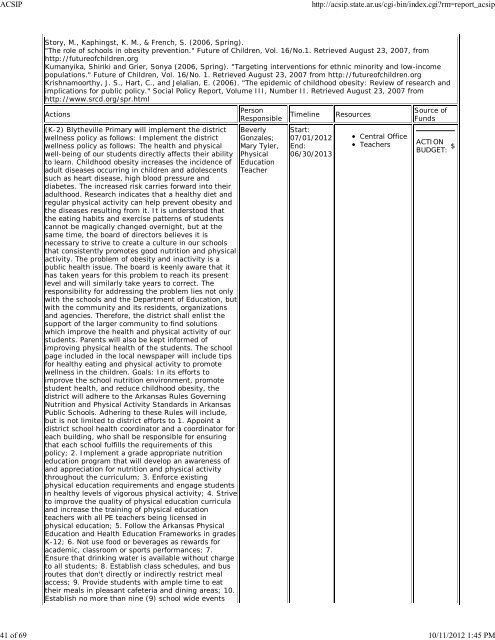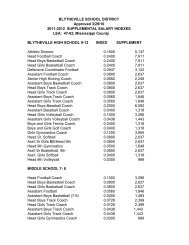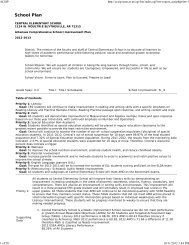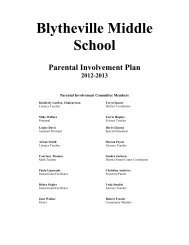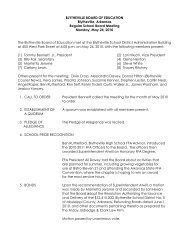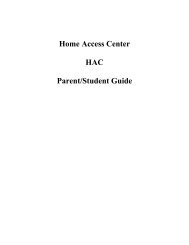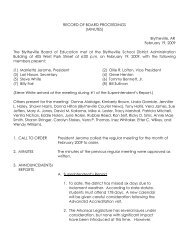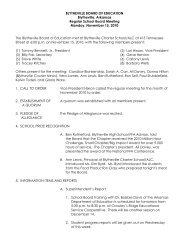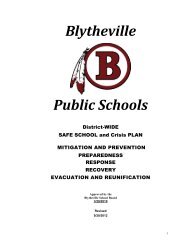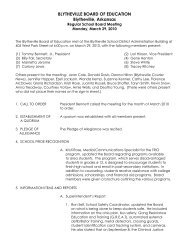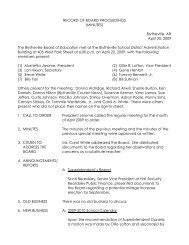School Plan - Blytheville Public Schools
School Plan - Blytheville Public Schools
School Plan - Blytheville Public Schools
You also want an ePaper? Increase the reach of your titles
YUMPU automatically turns print PDFs into web optimized ePapers that Google loves.
ACSIP http://acsip.state.ar.us/cgi-bin/index.cgi?rm=report_acsip<br />
Story, M., Kaphingst, K. M., & French, S. (2006, Spring).<br />
"The role of schools in obesity prevention." Future of Children, Vol. 16/No.1. Retrieved August 23, 2007, from<br />
http://futureofchildren.org<br />
Kumanyika, Shiriki and Grier, Sonya (2006, Spring). "Targeting interventions for ethnic minority and low-income<br />
populations." Future of Children, Vol. 16/No. 1. Retrieved August 23, 2007 from http://futureofchildren.org<br />
Krishnamoorthy, J. S., Hart, C., and Jelalian, E. (2006). "The epidemic of childhood obesity: Review of research and<br />
implications for public policy." Social Policy Report, Volume III, Number II. Retrieved August 23, 2007 from<br />
http://www.srcd.org/spr.html<br />
Person<br />
Actions<br />
Responsible<br />
(K-2) <strong>Blytheville</strong> Primary will implement the district Beverly<br />
wellness policy as follows: Implement the district Gonzales;<br />
wellness policy as follows: The health and physical Mary Tyler,<br />
well-being of our students directly affects their ability Physical<br />
to learn. Childhood obesity increases the incidence of Education<br />
adult diseases occurring in children and adolescents Teacher<br />
such as heart disease, high blood pressure and<br />
diabetes. The increased risk carries forward into their<br />
adulthood. Research indicates that a healthy diet and<br />
regular physical activity can help prevent obesity and<br />
the diseases resulting from it. It is understood that<br />
the eating habits and exercise patterns of students<br />
cannot be magically changed overnight, but at the<br />
same time, the board of directors believes it is<br />
necessary to strive to create a culture in our schools<br />
that consistently promotes good nutrition and physical<br />
activity. The problem of obesity and inactivity is a<br />
public health issue. The board is keenly aware that it<br />
has taken years for this problem to reach its present<br />
level and will similarly take years to correct. The<br />
responsibility for addressing the problem lies not only<br />
with the schools and the Department of Education, but<br />
with the community and its residents, organizations<br />
and agencies. Therefore, the district shall enlist the<br />
support of the larger community to find solutions<br />
which improve the health and physical activity of our<br />
students. Parents will also be kept informed of<br />
improving physical health of the students. The school<br />
page included in the local newspaper will include tips<br />
for healthy eating and physical activity to promote<br />
wellness in the children. Goals: In its efforts to<br />
improve the school nutrition environment, promote<br />
student health, and reduce childhood obesity, the<br />
district will adhere to the Arkansas Rules Governing<br />
Nutrition and Physical Activity Standards in Arkansas<br />
<strong>Public</strong> <strong>School</strong>s. Adhering to these Rules will include,<br />
but is not limited to district efforts to 1. Appoint a<br />
district school health coordinator and a coordinator for<br />
each building, who shall be responsible for ensuring<br />
that each school fulfills the requirements of this<br />
policy; 2. Implement a grade appropriate nutrition<br />
education program that will develop an awareness of<br />
and appreciation for nutrition and physical activity<br />
throughout the curriculum; 3. Enforce existing<br />
physical education requirements and engage students<br />
in healthy levels of vigorous physical activity; 4. Strive<br />
to improve the quality of physical education curricula<br />
and increase the training of physical education<br />
teachers with all PE teachers being licensed in<br />
physical education; 5. Follow the Arkansas Physical<br />
Education and Health Education Frameworks in grades<br />
K-12; 6. Not use food or beverages as rewards for<br />
academic, classroom or sports performances; 7.<br />
Ensure that drinking water is available without charge<br />
to all students; 8. Establish class schedules, and bus<br />
routes that don't directly or indirectly restrict meal<br />
access; 9. Provide students with ample time to eat<br />
their meals in pleasant cafeteria and dining areas; 10.<br />
Establish no more than nine (9) school wide events<br />
Timeline Resources<br />
Start:<br />
07/01/2012<br />
End:<br />
06/30/2013<br />
Central Office<br />
Teachers<br />
Source of<br />
Funds<br />
ACTION<br />
BUDGET: $<br />
41 of 69 10/11/2012 1:45 PM


